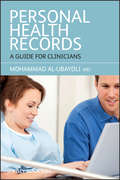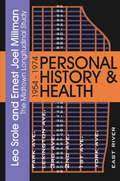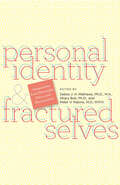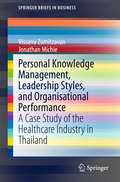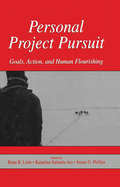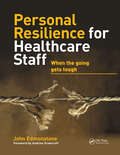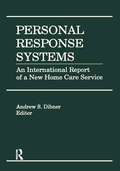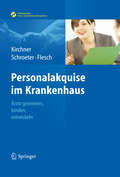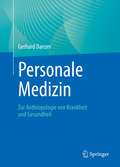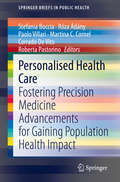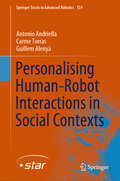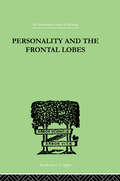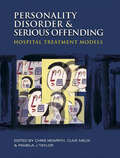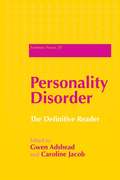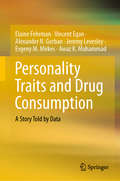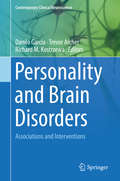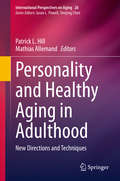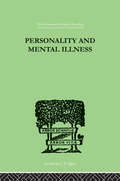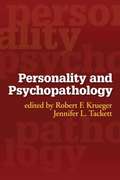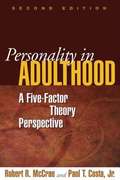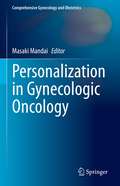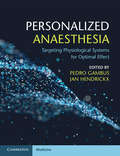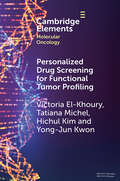- Table View
- List View
Personal Health Records
by Mohammad Al-UbaydliPatient-controlled personal health records are the key to successful interaction between physician and patient. They form the core for joined-up communication throughout health organizations. Still, the very name is capable of alarming both patient and doctor. Are they reliable? Are they complete? Are they confidential? Where do you access them?For the doctor, additional concerns surround the implementation: how do you include these online tools in your busy schedule?How much will they add to your existing spend on information technology?Can you get paid for doing all this extra work?Now you can find dependable answers to all of these questions.Written by a physician who has developed his own personal health records software for patients and doctors to interact, Personal Health Records: A Guide for Clinicians explains how to get the best from your patient's records and how to put the information to good use, helping both your patient and yourself to a more effective and efficient outcome in any clinical situation. "The author is a clinical academic, patient and pioneer in his field and does a grand job of explaining the ins and outs of PHRs in a non-patronising manner for the non-tech savvy" - From a review published in Health Services Journal by: Dr Emma Stanton, Commonwealth Fund Harkness Fellow and Specialist Registrar at South London and Maudsley NHS Foundation Trust
Personal History and Health
by Leo SroleScientists, philosophers, and storytellers often question why human beings appear to remain constant while existing in a state of change at the same tune. Among those who explore and expose dramatic conflicts between human stability and flux, the number of behavioral scientists has remained relatively low - that is, until Leo Srole followed the progress of a large cohort of people in his Midtown Longitudinal Study. This statistical project was designed to analyze mental health and assess human biological, social, and psychological change. New York's Upper East Side was the study's focus, a sociologically insular community, consisting of loosely differentiated neighborhoods, with a population of generalizable significance that transcended individual characteristics. Midtowners, studied hi 1954 then reinterviewed in 1974, were the subjects of analysis. After a twenty-year hiatus, Srole's eagerly awaited findings and outcomes are available.Personal History and Health by Ernest Joel Millman is a posthumous synthesis of Leo Srole's seminal behavioral study. This book presents the principal findings of MLS - with emphasis on adult mental health predictors, not cause-and-effect relationships. Srole used such biophysical correlates as gender and generation, mental health and history of somatic disorders, and the statistical methods of multiple correlation and regression analysis to predict average mental health. Through this work, Srole's pioneering exploration of social age and adult mental health - in particular how they differed for the women and men of the Midtown Longitudinal Study - has been completed. Personal History and Health is the conclusive, long-range view of those changes.These are Srole's final perspectives on mental health. As was characteristic of him, it is not exploratory or confirmatory, nor does it declare conclusions; rather, it raises questions. Millman offers an accessible yet sophisticated presentation of sociomedical sampling and analysis in language which may be understood by statistically unsophisticated readers, placing all of the explanations, details, figures, and tables in comprehensive statistical appendices. This book will appeal to those in the mental health field, sociomedical scientists, and those with interest in the socioeconomic correlates of health status and/or social mobility in urban society.
Personal Identity and Fractured Selves: Perspectives from Philosophy, Ethics, and Neuroscience
by Debra J. H. Mathews, Hilary Bok, and Peter V. RabinsThis book brings together some of the best minds in neurology and philosophy to discuss the concept of personal identity and the moral dimensions of treating brain disease and injury. The contributors engage a crucial question: When an individual’s personality changes radically because of disease or injury, should this changed individual be treated as the same person?Rapid advances in brain science are expanding knowledge of human memory, emotion, and cognition and pointing the way toward new approaches for the prevention and treatment of devastating illnesses and disabilities. Through case studies of Alzheimer disease, frontotemporal dementia, deep brain stimulation, and steroid psychosis, the contributors highlight relevant ethical and social concerns that clinicians, researchers, and ethicists are likely to encounter. Personal Identity and Fractured Selves represents the first formal collaboration between the Brain Sciences Institute and the Berman Institute of Bioethics, both at the Johns Hopkins University. The book asks neuroscientists and philosophers to address important questions on the topic of personal identity in an effort to engage both fields in fruitful conversation. Contributors: Samuel Barondes, M.D., University of California, San Francisco; David M. Blass, M.D., Johns Hopkins University School of Medicine; Patrick Duggan, A.B., Johns Hopkins Berman Institute of Bioethics; Ruth R. Faden, Ph.D., M.P.H., Johns Hopkins Berman Institute of Bioethics; Michael S. Gazzaniga, Ph.D., University of California, Santa Barbara; Guy M. McKhann, M.D., Johns Hopkins University School of Medicine; John Perry, Ph.D., Stanford University; Carol Rovane, Ph.D., Columbia University; Alan Regenberg, M.Be., Johns Hopkins Berman Institute of Bioethics; Marya Schechtman, Ph.D., University of Illinois at Chicago; Maura Tumulty, Ph.D., Colgate University
Personal Knowledge Management, Leadership Styles, and Organisational Performance
by Vissanu Zumitzavan Jonathan MichieThis book presents unique management perspectives from Thailand's Healthcare Industry. It focuses on the areas of Personal Knowledge Management, Leadership Styles and Organisational Performance. The book highlights the various business challenges that organisations face in the context of globalisation, which itself has produced new opportunities and difficulties alike. In addition, it also elaborates on how even large organisations with strong histories can no longer compete unless they are willing to adapt to changing conditions. Demonstrating how transferring and encouraging knowledge within an organisation can generate approaches that promote its continuing success, the book mainly focuses on the perspective of the Resource Based View, a broadly recognised method for maintaining the competitive advantages of an organisation. It also stresses the importance of making the most use of organisational resources. The book offers a valuable reference work, not only for practitioners and academic researchers in the fields of Business & Management but also for students taking Leadership Management, Organisational Learning and Organisational Performance Appraisal courses, serving as a sourcebook for the principles of successful management.
Personal Nutrition
by Marie A. BoyleBecome a smarter consumers with PERSONAL NUTRITION, Ninth Edition. Engaging and accessible, Boyle provides a solid grounding in fundamental nutritional principles and how to apply them to make informed, healthy choices. The Ninth Edition is thoroughly updated to reflect the latest research, recommendations, and current trends and issues. It also features new and revised illustrations, photographs, examples, and learning objectives to make material even more timely, relevant, and compelling for today's learners.
Personal Nutrition
by Marie BoyleBecome a smarter consumer with Boyle's PERSONAL NUTRITION, 10th Edition. Packed with the latest research, recommendations and emerging trends, this text equips you with a solid foundation in fundamental nutritional principles and the expertise to make informed, healthy choices. Lively illustrations, photographs and examples bring chapter concepts to life, while features like "The Savvy Diner" and "Eat Well, Be Well" offer practical tips you can put into immediate practice. The text is also supported by MindTap Nutrition, which helps you learn on your terms. The most engaging and customizable online solution in nutrition, MindTap combines readings, multimedia, assessments, activities and access to Diet & Wellness Plus--giving you everything you need to maximize your course success. Take charge of your own nutrition and health with Boyle's PERSONAL NUTRITION!
Personal Project Pursuit: Goals, Action, and Human Flourishing
by Brian R. Little Susan D. Phillips Katariina Salmela-AroPersonal Project Pursuit is the first book to feature Brian Little's highly respected personal projects analysis (PPA), one of the pioneering theories in contemporary personality and motivational psychology. The book examines both the internal and external dynamics of personal goals and projects and clearly demonstrates that human flourishing is enhanced when individuals are engaged in the pursuit of personal projects. The book opens with the theory and methodologies of personal projects research. The historical perspective on the development of the two dominant research perspectives from personality and developmental psychology is explored. Section II examines the internal dynamics and competing demands of goal formulation and project inception. The third part accentuates the role that social ecologies play in shaping the nature and outcomes of personal projects. These chapters highlight the importance of interpersonal relationships, organizational contexts, and the societal and cultural expectations in affecting the pursuit of personal projects. Ideas for orchestrating the environment to enhance human flourishing are explored. Section IV demonstrates how personal projects can illuminate and enhance human flourishing, from psychological well being to physical health. The book concludes with applications for enhancing human flourishing from individual counseling to public policy. Personal Project Pursuit is intended for advanced students, researchers, and practitioners in personality, social, developmental, industrial/organizational, health, environmental, clinical and counseling psychology interested in motivation and well being. An excellent supplemental text for courses on personality, motivation, positive psychology, well being, personal and life span development, the book's applied focus will appeal to counselors and rehabilitation/occupational therapists.
Personal Resilience for Healthcare Staff: When the Going Gets Tough
by John EdmonstoneIn this book, the author explores what day-to-day pressures are and why they seem to affect healthcare staff in different ways. He offers a helpful model of personal resilience with thoughtful and easily applied strategies for survival.
Personal Response Systems: An International Report of a New Home Care Service
by Andrew S DibnerThis important new book describes the origins, developments, and current status of personal response systems, a new means for persons at risk who live alone to get help in case of emergency. In Personal Response Systems, experts from ten countries report on the status, achievements, and challenges involved in setting up, distributing, and operating personal response systems (PRS). Experienced authors from a variety of backgrounds describe the technology, economics, and social effects of PRS, and its integration into existing health and housing programs. Professionals who provide home health services will find important information about the most efficient and cost effective designs of personal response systems. They will learn how to evaluate and recommend the most appropriate systems for their clients with the assistance of this valuable new book. Research on the frequency and types of emergencies and the many psychological and social benefits to users of this new technology and their families are also discussed. Personal Response Systems covers systems in a number of countries, including Japan, Israel, Sweden, New Zealand, and Germany. Authors representing universities, social agencies, and manufacturing plants provide a balanced, thorough presentation of the subject. These authors discuss: the technology of personal response systems demographic trends how to set up a PRS in a community the integration of PRS into housing for the elderly and disabled benefits to consumers and health care systems the effects of PRS on family relationships emergencies best suited for PRS analysis of how future technology will expand the medical and protective functions of PRSHealth care planners, social workers, physicians, case managers, housing developers and managers, and others involved in caring for the elderly or disabled will find a valuable store of information in this comprehensive volume. They will be able to evaluate more quickly the most appropriate PRS services for their clients and tenants.
Personalakquise im Krankenhaus
by Helga Kirchner Markus Flesch Michael SchroeterDer Wettbewerb um gutes Personal wird härter. Und weil in Dienstleistungsunternehmen wie Krankenhäusern die Kompetenz der Mitarbeiter der Schlüssel zum Erfolg ist, steht die Frage der Personalgewinnung und -sicherung dort inzwischen weit oben auf der Agenda. In dem Band werden die wichtigsten Aspekte der Personalgewinnung besprochen: vom Recruiting in sozialen Netzwerken und auf dem globalisierten Arbeitsmarkt über Aus-, Fort- und Weiterbildungskonzepte bis zum alters- und familiengerechten Arbeiten. Mit Praxistipps, Zusammenfassungen, Checklisten.
Personale Medizin: Zur Anthropologie von Krankheit und Gesundheit
by Gerhard DanzerDer Begriff und die Inhalte der "Personalen Medizin" haben sich in den letzten Jahre etabliert. Patient*innen und Ärzt*innen verstehen darunter eine Heilkunde für Personen von Personen. In den letzten zehn Jahren haben sich die Konzepte der Personalen Medizin - ähnlich wie die gesamte Schulmedizin - weiterentwickelt. Dieses Buch befasst sich mit der Anthropologie von Gesundheit und Krankheit, mit Ärzten und Patienten und deren Beziehung, also auch ganz praktisch mit den biomedizinisch-morphologischen und psychosozial-funktionellen Störungen.
Personalised Health Care: Fostering Precision Medicine Advancements for Gaining Population Health Impact (SpringerBriefs in Public Health)
by Stefania Boccia Paolo Villari Róza Ádány Martina C. Cornel Corrado De Vito Roberta PastorinoPractitioners are increasingly adopting a personalised medicine approach to individually tailored patient care, especially disease diagnosis and treatment with the use of biomarkers. However, development and implementation of such approaches to chronic disease prevention need further investigation and concerted efforts for proper use in healthcare systems. This book provides high-quality, multidisciplinary knowledge from research in personalised medicine, specifically personalised prevention of chronic disease. It addresses different perspectives of prevention in the field, and is the outcome of a four-year work of the Personalized prevention of Chronic Disease (PRECeDI) Consortium, a multi-disciplinary and multi-professional team of experts. The Consortium jointly agreed to document and address the five aspects or domains of personalised medicine and prevention as individual chapters: Identification of biomarkers for the prevention of chronic diseaseEvaluation of predictive genomic applicationsEthico-legal and policy issues surrounding personalised medicineRoles and responsibilities of stakeholders in informing healthy individuals on their genome: a sociotechnical analysisIdentification of organisational models for the provision of predictive genomic applicationsThe book focuses on the Consortium's recommendations that are derived from each of these domains based on up-to-date evidence and research that the authors write, follow, and systematically organise and report.Personalisation of health care is, eventually, a driver of innovation in research and healthcare systems. With this SpringerBrief on Personalised Health Care: Fostering Precision Medicine Advancements for Gaining Population Health Impact, the Consortium provides further evidence of the clinical validity and utility of personalised medicine with special emphasis on the prevention of chronic diseases. The book is a useful resource for policy makers, industry and healthcare professionals, scientists, technology-sector professionals, investors, citizens, and private companies that need proper advice to realise the potential of personalised medicine.
Personalising Human-Robot Interactions in Social Contexts (Springer Tracts in Advanced Robotics #159)
by Carme Torras Antonio Andriella Guillem AlenyàThis book offers an insightful exploration of the pivotal role of robots in our ever-changing society. As intelligent machines become increasingly integrated into various aspects of our lives, their impact on how we live, work, and interact becomes undeniable. Within these pages, the book delves into the key concept of personalisation, unravelling the profound importance of tailoring robotic interactions to meet the unique needs and preferences of individuals. This exploration seeks to foster a deeper understanding of how robots can enhance our lives and potentially be a worthwhile technology to address some important societal issues. To showcase that, the book centres on a practical use case that is built upon collaboration with healthcare experts: designing personalised robots for assisting patients affected by cognitive decline. With over 50 million people affected by dementia worldwide and an expected tripling of this number by 2050, the need for effective and accessible treatments is more pressing than ever. While there are no pharmacological treatments for this syndrome, cognitive training has shown promise for maintaining and even improving cognitive functioning among dementia patients. However, the shortage of healthcare professionals capable of delivering such therapy presents a significant challenge. This is where the potential of robots comes into play. This book delves into the potential of robotic technology designed to bridge this societal gap. By taking a therapist-oriented approach, it investigates the insights that can be gleaned from involving therapists in the entire pipeline of the design process as well as in the automatisation of the robots' assistive behaviour. Specifically, this book aims to address personalisation from two complementary perspectives by designing robots that are both adaptable and adaptive.
Personality And The Frontal Lobes: AN INVESTIGATION OF THE PSYCHOLOGICAL EFFECTS OF DIFFerent Types (International Library Of Psychology Ser.)
by Petrie, Asenath"First Published in 1999, Routledge is an imprint of Taylor & Francis, an informa company."
Personality Disorder and Serious Offending: Hospital treatment models
by Pamela Taylor Christopher Newrith Clive MeuxPeople with personality disorder who offend tend to be neglected by health services in most countries. In the UK, there has been renewed interest in the field since government initiatives in the end of the 1990s. Government proposals themselves are controversial, but there is growing recognition that it is unsafe, both for the general public and fo
Personality Disorder: The Definitive Reader
by Gwen Adshead Kingsley Norton Robert Hinshelwood Caroline JacobA Personality Disorder Reader offers a comprehensive and accessible collection of papers that will be practically useful to practitioners working in secure and non-secure settings with patients who have personality disorders. This book brings together fourteen classic papers, which address the impact that working with personality disorder patients can have on staff. It also offers theoretical explanations for personality disorder, and explores other issues such as the concept of boundaries in clinical practice, psychiatric staff as attachment figures and the relationship between severity of personality disorder and childhood experiences. Each paper is introduced with contextual material, and is followed by a series of questions that are intended to be used as educational exercises. This book will be essential reading for clinical and forensic psychologists, psychiatrists, community psychiatric nurses, social workers and students.
Personality Traits and Drug Consumption: A Story Told by Data (SpringerBriefs in Statistics)
by Alexander N. Gorban Jeremy Levesley Elaine Fehrman Vincent Egan Evgeny M. Mirkes Awaz K. MuhammadThis book discusses the psychological traits associated with drug consumption through the statistical analysis of a new database with information on 1885 respondents and use of 18 drugs. After reviewing published works on the psychological profiles of drug users and describing the data mining and machine learning methods used, it demonstrates that the personality traits (five factor model, impulsivity, and sensation seeking) together with simple demographic data make it possible to predict the risk of consumption of individual drugs with a sensitivity and specificity above 70% for most drugs. It also analyzes the correlations of use of different substances and describes the groups of drugs with correlated use, identifying significant differences in personality profiles for users of different drugs. The book is intended for advanced undergraduates and first-year PhD students, as well as researchers and practitioners. Although no previous knowledge of machine learning, advanced data mining concepts or modern psychology of personality is assumed, familiarity with basic statistics and some experience in the use of probabilities would be helpful. For a more detailed introduction to statistical methods, the book provides recommendations for undergraduate textbooks.
Personality and Brain Disorders: Associations and Interventions (Contemporary Clinical Neuroscience)
by Richard M. Kostrzewa Trevor Archer Danilo GarciaBrain disorders (neurodevelopmental, neurodegenerative, and affective disorders) can be investigated, treated, and prevented using person-centered methods. Because researchers have not reached a clear consensus on whether or not personality is stable or changeable, it has been difficult to outline how to use these methods in the care of people with brain disorders. Thus, the first part aims to identify the ways in which brain disorders and personality are linked. The second part explores different person-centered approaches that can be incorporated in a healthcare or education setting to help people with various brain disorders and to promote physical, mental and social health. The third part focuses on challenges and new venues.
Personality and Healthy Aging in Adulthood: New Directions and Techniques (International Perspectives on Aging #26)
by Patrick L. Hill Mathias AllemandThis book highlights international efforts to better understand the role of individual differences in healthy aging by exploring new directions, methods, and questions within the field. The book considers how to measure personality and personality change during adulthood, the associations between personality and healthy aging outcomes over time, and the role of personality in building interventions to promote healthy aging. The first section considers the value of personality constructs for healthy aging outcomes beyond the broad Big Five personality dimensions. It discusses the role of attachment, purpose, and affect, and also touches on the issue of psychopathology. The second section presents innovative assessment methods, research designs beyond classical longitudinal approaches, as well as sophisticated and integrative techniques for analyzing personality change processes. The third section raises new important questions, such as how interventionists from non-personality domains can incorporate personality processes in their intervention programs. It also discusses how different domains of individual functioning may interact in concert to predict healthy aging outcomes, as well as how more integrative lifespan models of healthy aging may advance research on personality and healthy aging. Overall, this book will spark interest and chart new directions for researchers, practitioners and interventionists in healthy aging, gerontology and applied fields.
Personality and Mental Illness: An Essay in Psychiatric Diagnosis (International Library Of Psychology)
by Bowlby, JohnFirst published in 1999. Routledge is an imprint of Taylor & Francis, an informa company.
Personality and Psychopathology
by Jennifer L. Tackett Robert F. KruegerTraditionally, personality and psychopathology have been distinct areas of inquiry. This important volume reviews influential research programs that increasingly bridge the gap between the two areas. Presented are compelling perspectives on whether certain personality traits or structures confer risks for mental illness, how temperament interacts with other influences on psychological adaptation, links between personality disorders and mood and anxiety disorders, implications for effective intervention, and more.
Personality in Adulthood, Second Edition
by Robert T. Costa Jr. Robert R. MccraeThis influential work examines how enduring dispositions or traits affect the process of aging and shape each individual's life course. From two well-known authorities in the field, the volume is grounded in a growing body of empirical evidence. Critically reviewing different theories of personality and adult development, the authors explain the logic behind the scientific assessment of personality, present a comprehensive model of trait structure, and examine patterns of trait stability and change after age 30, incorporating data from ongoing cross-sectional and longitudinal studies. Written in a clear, jargon-free style, this book is an ideal text for advanced students and a timely reference for researchers and clinicians.
Personalization in Gynecologic Oncology (Comprehensive Gynecology and Obstetrics)
by Masaki MandaiThis book thoroughly illustrates the designed and tailored medical approaches for tumors of the female reproductive organ. The chapters explore different cancer species such as ovarian cancer, endometrial cancer, cervical cancer, etc. Various treatment modalities such as immunotherapy and histotype-specific treatment are delivered, and it offers a chapter on how genome-wide analysis contributes to personalized treatment. It is essential to understand this concept because many molecular target drugs and the prevalence of genome-based analysis in clinical settings have enabled us to introduce valid precision medicine in the field of gynecologic oncology. Chapters explain the stream of transition from conventional standardized treatment to personalized treatment and address future perspectives.Personalization Gynecologic Oncology is a well-designed source for beginning to advanced oncologists, gynecologists, geneticists, genetic counselors, and nurses. Offering the latest treatment strategies, the Editor hopes the ideas presented here will be a foundation for further development in the field.
Personalized Anaesthesia: Targeting Physiological Systems for Optimal Effect
by Pedro L. Gambús Hendrickx Jan F. A.Personalized Anaesthesia presents a modern vision of anaesthesia. Integrating technology and knowledge from leading experts in the field, this book will change the way anaesthesia is both taught and practiced. Modern practice requires the anaesthetist to provide patient-specific management. This is the first resource to be organised by the desired physiological effect, rather than by drug groupings, explaining how physiological changes can be produced and controlled according to the characteristics of each patient and the particular surgical context. The book integrates physiology, pharmacology and technology, and applies these concepts in a systematic manner to each homeostatic system. This will optimise drug titration, effect quantification and decision making in anaesthesia practice to match the needs of the individual patient. Complex mathematical and scientific concepts are explained using accessible text, colour illustrations throughout and graphs. This is an essential text for any consultant or trainee working in anaesthesia.
Personalized Drug Screening for Functional Tumor Profiling (Elements in Molecular Oncology)
by Victoria El-Khoury Tatiana Michel Hichul Kim Yong-Jun KwonDespite considerable advances in our understanding of the biology that underlies tumor development and progression of cancer and the rapidly evolving field of personalized medicine, cancer is still one of the deadliest diseases. Many cancer patients have benefited from the survival improvements observed with targeted therapies but only a small subset of patients receiving targeted drugs experience an objective response. Because cancer is a complex and heterogeneous disease, the search for effective cancer treatments will need to address not only patient-specific molecular defects but also aspects of the tumor microenvironment. The functional tumor profiling directly measures the cellular phenotype, in particular tumor growth, in response to drugs using patient-derived tumor models and might be the next step toward precision oncology. In this Element, the authors discuss the personalized drug screening as a novel patient stratification strategy for the determination of individualized treatment choices in oncology.
